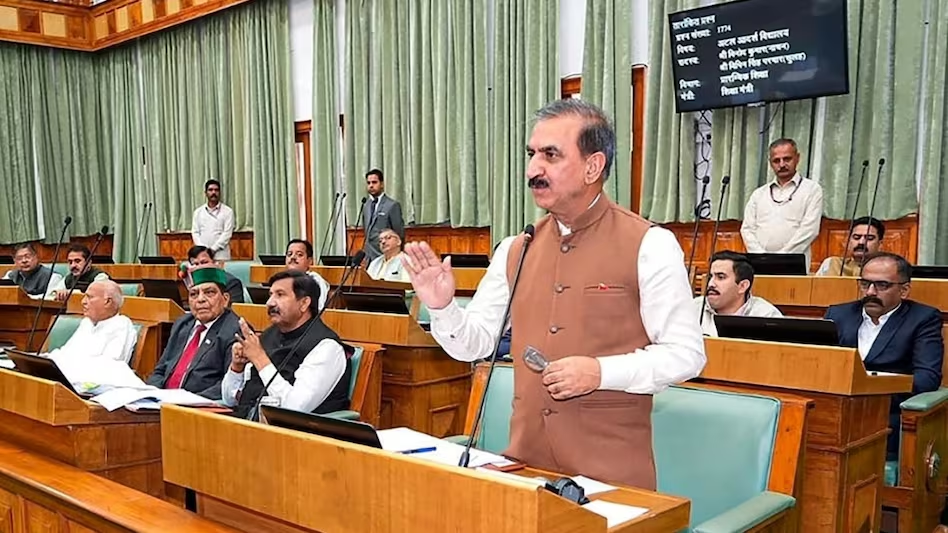- Courses
- GS Full Course 1 Year
- GS Full Course 2 Year
- GS Full Course 3 Year
- GS Full Course Till Selection
- Answer Alpha: Mains 2025 Mentorship
- MEP (Mains Enrichment Programme) Data, Facts
- Essay Target – 150+ Marks
- Online Program
- GS Recorded Course
- Polity
- Geography
- Economy
- Ancient, Medieval and Art & Culture AMAC
- Modern India, Post Independence & World History
- Environment
- Governance
- Science & Technology
- International Relations and Internal Security
- Disaster Management
- Ethics
- NCERT Current Affairs
- Indian Society and Social Issue
- NCERT- Science and Technology
- NCERT - Geography
- NCERT - Ancient History
- NCERT- World History
- NCERT Modern History
- CSAT
- 5 LAYERED ARJUNA Mentorship
- Public Administration Optional
- ABOUT US
- OUR TOPPERS
- TEST SERIES
- FREE STUDY MATERIAL
- VIDEOS
- CONTACT US
Anti-Defection Law Averts Political Crisis in Himachal Pradesh
Anti-Defection Law Averts Political Crisis in Himachal Pradesh

Why in the News?
- Himachal Pradesh Chief Minister highlighted the role of the anti-defection law in safeguarding democracy during a political crisis in the state in 2024.
- This comes in the context of six Congress MLAs voting in favor of BJP during Rajya Sabha elections.
- These MLAs were later disqualified under Anti- Defection Law.
Key Highlights:
- The anti-defection law was instrumental in dealing with cross-voting during the 2024 Rajya Sabha elections.
|
Cross-voting: It refers to a situation where lawmakers or elected representatives vote against the official party line during an election or legislative process. |
- The law played a crucial role in maintaining democratic order in Himachal Pradesh by ensuring that the elected government was not toppled through unethical means like cross-voting and defection.
- Six Congress MLAs voted in favor of the BJP candidate, leading to political instability.
- These MLAs were later disqualified under the anti-defection provisions.
- The Himachal Pradesh Vidhan Sabha passed a Bill to stop the pension benefits of disqualified legislators.
- The Bill applies to MLAs who are disqualified during their term, not those who voluntarily retire or complete their tenure.
- Constitutional Eligibility: The state legislature has the power to make laws on salaries and pensions of MLAs under Entry 38 of the State List (Seventh Schedule) of the Constitution.
Such laws must not violate Article 14 (Right to Equality).
- Denying pension to disqualified MLAs:
- Acts as a deterrent to unethical practices like defection.
- Ensures public funds are not misused.
- Reinforces moral accountability in public office.
- A two-day conference was held focusing on strengthening democratic institutions, improving legislation, and enhancing transparency.
|
Anti- defection Law: The Anti-defection Law in India was enacted to prevent political defections by legislators — that is, elected members switching parties for personal gain or under political pressure.
Keisham Meghachandra Singh v. Speaker, Manipur Legislative Assembly, 2020
|
Challenges and Way Forward:
|
Challenges |
Way Forward |
|
Delays in disqualification decisions |
Set fixed timeframes and empower neutral bodies for speedy rulings. |
|
Speaker’s bias in disqualification cases |
Transfer power to an independent tribunal or the Election Commission. |
|
Ambiguity in legal definitions (e.g., "voluntarily giving up membership") |
Amend and clarify legal language in the anti-defection law. |
|
Misuse of anti-defection provisions |
Allow healthy dissent within parties without penalizing genuine concerns. |
Conclusion:
The anti-defection law played a crucial role in maintaining democratic order in Himachal Pradesh during a politically turbulent time. The added step of stopping pensions for disqualified MLAs strengthens accountability. However, reforms are still needed to improve transparency, impartiality, and timely action in dealing with defections.
|
EnsureIAS Mains Question: “The Anti-Defection Law, while intended to curb political defections and ensure stability, has raised concerns about suppressing legitimate dissent and centralizing authority." Critically examine the effectiveness and limitations of the Anti-Defection Law. Suggest reforms to strengthen its implementation. (250 words) |
|
EnsureIAS Prelims Question: Q. With reference to the provisions of the anti-defection law, consider the following statements:
Which of the statements given above is/are correct?
Answer: a Explanation: Statement 1: Correct. The 91st Amendment Act of 2003 removed the provision that allowed defectors to escape disqualification if one-third of the members of a party defected (split). This amendment was made to close the loophole that allowed legislators to avoid disqualification by citing a "split" in the party. Statement 2: Correct. According to the Kihoto Hollohan case (1993), the presiding officer functions like a judicial tribunal when deciding defection cases. This means their decision is subject to judicial review by the Supreme Court and High Courts. Their decision can be reviewed on grounds such as bias or procedural errors. Statement 3: Incorrect. The presiding officer cannot disqualify a member if the defection is condoned or sanctioned by the political party they belong to. If the political party allows or condones the defection, it does not automatically lead to disqualification. |
|
Also Read |
|
| FREE NIOS Books | |



